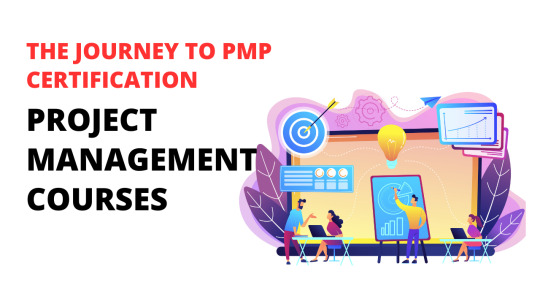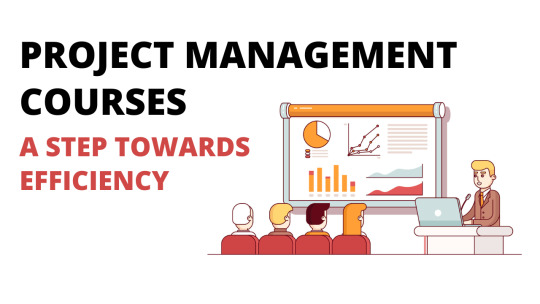#Project Management courses
Explore tagged Tumblr posts
Text
Discover the essential guide to kickstart your project management journey with "New to Project Management? Start with Easy Steps." This blog resource simplifies complex concepts, providing you with practical tools and strategies to effectively manage projects from inception to completion. Whether you're a novice or looking to refresh your skills, this guide empowers you to navigate challenges with confidence, ensuring successful outcomes and enhanced productivity. Embrace the fundamentals of project management and take the first step towards mastering your projects today.
0 notes
Text
Advance Your Career with Expert Project Management Courses

African eDevelopment Resource Centre offers top-tier project management courses designed to equip professionals with essential skills and certifications. Gain practical knowledge, enhance efficiency, and lead successful projects with confidence. Enroll today and take your career to the next level!
#Project Management Courses#programming#software engineering#Project Management#management#business development#automation#careergrowth
0 notes
Text

Project Management Tools Courses: Optimize Your Workflow
Enhance your project management skills with our Project Management Tools Courses. Learn how to leverage industry-leading tools to streamline tasks, improve team collaboration, and optimize workflows for greater efficiency. Equip yourself with the knowledge to manage projects seamlessly and deliver outstanding results.
0 notes
Text
Project Management Certification: Is it Worth It? | PGDM - MIT SDE

Understanding Project Management Certifications
Before diving into the benefits, it’s essential to understand what each certification entails:
PMP (Project Management Professional): Offered by the Project Management Institute (PMI), the PMP is one of the most recognized and respected certifications in project management. It demonstrates your ability to effectively manage projects, timelines and budgets.
PRINCE2 (Projects IN Controlled Environments): This certification is widely used in the UK and internationally. PRINCE2 focuses on strategies and provides managers with the skills to manage any project regardless of size or complexity.
Agile Certification: Agile certifications, such as Certified Scrum Master (CSM) or PMI-ACP (Agile Certified Professional), focus on the agile methodology, which is popular in software development and innovation because of its process repeatedly and for the sake of variation
#Project Management#Project Management courses#online Project Management#Project Management from MIT
0 notes
Text
Free Project Management Courses Are Now Offered Online As Well!
To learn new things courses are like paths! These courses help you gain knowledge and skills in different subjects. Some courses are about math and science teaching you about numbers and how the world works. Others focus on language and writing helping you to communicate better with words. There are also courses about history, where you learn about the past and how it shaped the present. Courses can be found in schools, where teachers guide you through lessons and homework. They can also be online, letting you learn from your computer at home. When you take a course, you may have lectures where teachers explain ideas and concepts. People take courses for many reasons.

These courses can be done online as well
Free project management courses are like opportunities to learn about organizing and completing tasks perfectly. They teach skills that help you manage projects from start to finish. These courses are available online, making them accessible to anyone with an internet connection. Project management involves planning, scheduling and coordinating activities to achieve specific goals. Free courses cover topics such as creating timelines, setting budgets and leading teams. They also explain different methods for organizing projects. The benefit of it is that it provides valuable skills that can be applied to various fields, from business to construction. Learning project management can make you more organized and efficient in your work.
Take these classes to properly analyze the vital data
Business analyst classes are like lessons that teach you how to understand and improve your businesses. They cover topics such as analyzing data, finding problems and also suggesting solutions. A business analyst's job is to study how a company works. These classes teach skills like gathering information from different sources and using it to make decisions. They also show you how to create reports and presentations to explain your findings. They help you develop skills that are useful in many industries like finance, technology and healthcare. Learning these skills can make you more valuable to employers and increase your chances of getting a good job.
#free project management course#project management courses#business analysis cbap#ba analyst course#cbap certification
0 notes
Text
The Journey to PMP Certification: Project Management Courses

In the fast-paced world of project management, having the right skills and certifications can make all the difference in your career. The Project Management Professional (PMP) certification is widely recognized as one of the most prestigious credentials for project managers. Obtaining this certification is not an easy feat, but it can be a game-changer for your career. One of the crucial steps on the journey to PMP certification is completing project management courses. In this article, we will explore the significance of project management courses in your path to becoming a PMP-certified professional.
Understanding the PMP Certification
Before delving into the importance of project management courses, let's take a closer look at the PMP certification itself. The PMP certification is awarded by the Project Management Institute (PMI), a globally recognized organization in the field of project management. This certification demonstrates that an individual possesses the necessary knowledge and skills to manage projects effectively. It is highly valued by employers and is often required for various project management positions.
To qualify for the PMP certification, candidates must meet specific eligibility criteria, which include a minimum number of hours of project management experience and education. Additionally, they must pass a rigorous PMP exam, which covers a wide range of project management topics and principles. The exam is known for its difficulty, and many candidates choose to prepare for it by enrolling in project management courses.
The Role of Project Management Courses
Project management courses play a pivotal role in preparing aspiring PMP candidates for the certification exam. These courses are designed to provide a structured and comprehensive approach to understanding the key concepts, methodologies, and best practices in project management. Let's explore why these courses are essential in the journey to PMP certification:
1. Comprehensive Content: PMP exam content is extensive and covers a wide array of topics, ranging from project initiation to closure. Project management courses are structured to cover each knowledge area in depth. They provide a systematic approach to understanding the principles and processes, making it easier for candidates to grasp the material.
2. Exam Preparation: PMP courses are specifically tailored to help candidates prepare for the certification exam. They often include practice exams and simulated tests to assess a candidate's readiness for the real exam. This exam preparation component is invaluable in boosting confidence and performance on the actual test day.
3. Instructor Expertise: Many project management courses are led by experienced instructors who are often PMP-certified themselves. These instructors bring real-world experience to the classroom, sharing practical insights and case studies. This firsthand knowledge can be invaluable for understanding how to apply project management concepts in the workplace.
4. Interactive Learning: Project management courses provide an interactive learning environment where candidates can ask questions, engage in discussions, and collaborate with peers. This dynamic interaction enhances the learning experience and helps candidates absorb and retain the information more effectively.
5. Structured Learning: PMP courses typically follow a structured curriculum that aligns with the PMBOK (Project Management Body of Knowledge) guide, which is the primary reference for the PMP exam. This alignment ensures that candidates cover all the essential topics and knowledge areas required for the exam.
6. Flexibility: Many project management courses are available in various formats, including in-person classes, online courses, and self-paced modules. This flexibility allows candidates to choose the learning method that best suits their schedule and learning style.
Choosing the Right Project Management Course
As you embark on your journey to PMP certification, it's essential to choose the right project management course. Here are some key factors to consider when making your selection:
1. Accreditation: Look for courses that are accredited by reputable organizations or institutions. PMI, for instance, has a Registered Education Provider (R.E.P.) program that accredits PMP exam preparation courses.
2. Instructor Qualifications: Check the qualifications and experience of the course instructor. Ideally, they should be PMP-certified and have extensive experience in the field of project management.
3. Course Content: Review the course curriculum to ensure it covers all the knowledge areas and topics specified in the PMP exam outline.
4. Learning Format: Consider your preferred learning format, whether it's in-person, online, or self-paced. Choose the format that aligns with your schedule and learning style.
5. Cost: PMP courses come with varying price tags. While cost is a factor, it should not be the sole determinant. Consider the overall value and quality of the course concerning its price.
6. Reviews and Recommendations: Seek feedback from individuals who have taken the course or read reviews online. Recommendations and reviews can provide valuable insights into the course's effectiveness.
Beyond Certification: Real-World Application
Project management courses are not just about passing the PMP exam. They equip you with practical skills that you can apply in your day-to-day work as a project manager. Here's how project management knowledge gained from these courses extends beyond the certification:
1. Effective Project Management: The principles and best practices you learn in project management courses can be applied to real-world projects, making you a more effective project manager.
2. Career Advancement: PMP certification and the knowledge gained from courses can open doors to new career opportunities and higher earning potential.
3. Risk Management: Understanding risk management is a critical component of project management. Courses provide insights into identifying, analyzing, and mitigating risks in your projects.
4. Improved Communication: Effective communication is key to project success. Project management courses often cover communication strategies, helping you become a better communicator in your professional life.
5. Stakeholder Management: Managing stakeholders is an essential skill for project managers. Courses teach techniques for building and maintaining positive stakeholder relationships.
6. Adaptation to Change: In the dynamic field of project management, change is constant. Project management courses provide the tools to adapt and thrive in evolving project environments.
Conclusion
The journey to PMP certification is a significant undertaking, but project management courses are a crucial stepping stone along the way. They provide a structured and comprehensive approach to mastering the knowledge and skills required for successful project management. Beyond certification, the knowledge gained from these courses has practical applications that can enhance your career and make you a more effective project manager. As you consider your path to PMP certification, remember that investing in the right project management course can be an investment in your future success in the field of project management.
0 notes
Text
Project Management Courses Building One Leaders Skill at a Time
Project management is like the conductor of an orchestra, ensuring that every instrument plays in harmony to create a beautiful symphony. In the world of business, project managers are the conductors, and their orchestras are the teams working on various projects. To become an effective conductor, you need the right skills, and that’s where project management courses come into play. In this article, we’ll explore how project management courses are building leaders, one skill at a time.

What Is Project Management?
Before delving into the importance of Project management courses , let’s first understand what project management is. In simple terms, project management is the art and science of planning, executing, and closing projects efficiently and effectively. A project is a temporary endeavor with a specific goal, and project managers are responsible for guiding the project from start to finish. Project managers wear many hats. They create project plans, allocate resources, set timelines, manage risks, and ensure that the project is delivered on time and within budget. They’re also responsible for fostering teamwork, communication, and problem-solving within the project team.
Why Project Management Matters
Project management might seem like a complex task, but it’s an essential skill in today’s fast-paced, competitive business world. Here are some reasons why project management matters:
Efficiency: Without proper project management, chaos can ensue. Resources may be wasted, deadlines missed, and quality compromised. A well-managed project ensures that things run smoothly, saving time and money.
Risk Management: Every project comes with risks. A good project manager anticipates these risks and has strategies in place to mitigate them. This minimizes the chances of costly failures.
Quality Control: Project managers ensure that the final deliverable meets the required quality standards. They are responsible for maintaining consistency and excellence throughout the project.
Communication: Effective communication is at the core of project management. Project managers keep all team members on the same page, ensuring everyone knows their roles and responsibilities.
Customer Satisfaction: Satisfied customers are the lifeblood of any business. Project managers work to deliver projects that meet or exceed customer expectations.
Career Opportunities: A strong skill set in project management opens up numerous career opportunities. Many organizations seek professionals with these skills to lead their projects.
The Role of Project Management Courses
To become a competent project manager, you need to acquire specific skills. This is where project management courses step in. These courses provide aspiring project managers with the knowledge and tools they need to excel in their roles. Let’s delve into the role of project management courses in building leaders.
1. Learning the Fundamentals
Project management courses start with the basics. They teach you the core concepts, terminologies, and methodologies used in the field. You’ll learn about project life cycles, scope, time management, cost management, risk assessment, and more. These fundamentals lay the foundation for your journey as a project manager.
2. Developing Leadership Skills
Project managers are leaders. They guide their teams toward a common goal. Project management courses help you develop leadership skills such as decision-making, conflict resolution, and team motivation. You’ll learn how to inspire your team to give their best and collaborate effectively. Make sure check this link:- PMP Exam Prep
3. Practical Application
Theoretical knowledge alone won’t make you a great project manager. Project management courses often include practical exercises and case studies. These real-world examples help you apply what you’ve learned to solve actual project management challenges.
4. Industry-Relevant Tools
Project management involves using various software and tools to plan and execute projects. Project management courses introduce you to tools like Microsoft Project, Trello, or Asana. Learning to use these tools effectively can significantly boost your productivity and efficiency.
5. Risk Management
One of the critical aspects of project management is risk assessment and mitigation. Project management courses teach you how to identify potential risks, evaluate their impact, and develop strategies to minimize them. This skill is invaluable in ensuring project success.
6. Communication Skills
Effective communication is a cornerstone of successful project management. Project managers need to convey their ideas clearly and ensure that all team members understand their roles and tasks. Project management courses focus on improving your communication skills, both written and verbal.
7. Adaptability and Flexibility
The business world is constantly evolving. Project management courses teach you to be adaptable and flexible. You’ll learn to adjust your project plans when unexpected challenges arise, ensuring that the project stays on track.
8. Certification
Many project management courses offer certification upon completion. Certifications, such as the Project Management Professional (PMP) or Certified ScrumMaster (CSM), can boost your credibility and job prospects in the field.
9. Networking Opportunities
Project management courses often provide opportunities to network with other professionals in the field. Building a strong professional network can open doors to exciting career opportunities.
Who Benefits from Project Management Courses?
Project management courses aren’t limited to those who want to become full-time project managers. In fact, these courses can benefit a wide range of individuals, including:
Current Project Managers: Even experienced project managers can benefit from additional training and certification to enhance their skills and stay up-to-date with industry best practices.
Team Members: Team members who understand project management principles can contribute more effectively to their projects. This knowledge improves their overall efficiency and can lead to career advancement.
Entrepreneurs and Small Business Owners: Managing a project is a common task for entrepreneurs and small business owners. Project management courses help them handle their ventures more effectively.
Aspiring Managers: Individuals looking to move up the corporate ladder can gain an edge by adding project management skills to their resume. These skills demonstrate an ability to lead and manage complex initiatives.
Career Changers: If you’re considering a career change or want to explore new opportunities, project management can provide you with the skills and knowledge to enter this exciting field.
Conclusion
Project management are like the conductor’s baton, guiding individuals towards becoming effective leaders and managers in the world of business. They offer a wide array of skills and knowledge that are applicable in various professional settings. Whether you’re already a project manager, a team member, an entrepreneur, an aspiring manager, or someone looking for a career change, project management courses can be your ticket to success. With the right skills, you can become the conductor of your own orchestra, creating harmony and achieving remarkable results in the projects you lead. So, if you’re looking to build leadership skills, one skill at a time, consider enrolling in a project management course. Your journey to becoming a project management maestro begins here.
0 notes
Text
Why Are Management Consultants Important for Your Business?

In the dynamic landscape of business, striving for growth and productivity demands going the extra mile. Seeking an outside perspective through management consulting is a crucial step towards expansion, providing invaluable advice and strategic development. Based in the heart of Ottawa and serving clients nationwide, the management consultants at BEVA Global understands the significance of this practice, aiding businesses in facing challenges head-on and gaining exposure. Let’s delve into the essentials of management consulting and why it’s indispensable for your organization.
What is the core definition of management consulting?
The essence of management consulting lies in its definition – it is the practice dedicated to enhancing organizational performance. This is achieved primarily through a meticulous analysis of existing issues within the organization, coupled with the formulation of comprehensive plans for improvement.
What services can you expect from a management consultancy?
Beyond industry-specific best practices, a management consultant in Ottawa will immerse themselves in understanding your business. This entails thorough research on competitors and gathering crucial data to assist in crafting effective strategies. Their services extend to:
Analyzing financial trends through robust models and research.
Conducting insightful interviews with competitors, clients, and staff.
Mastering the fundamentals of all roles within the organization, paving the way for efficient training programs.
Offering expertise in the implementation of cutting-edge technologies.
Cultivating coaching skills and much more.
What are the benefits of hiring a management consultant?
The decision to bring a management consultant on board is driven by several compelling advantages, particularly in the context of your organization’s foundation. The management consultants at BEVA Global explain a few of the reasons why they are pivotal to your success:
Expertise tailored to the specific nuances of your industry, a critical asset for new business owners or entrepreneurs navigating diverse sectors.
Substantial cost savings by optimizing hiring decisions and identifying areas to trim unnecessary expenses.
The capability to handle challenging tasks, such as HR-related matters, when internal resources are limited.
An objective perspective that delivers candid evaluations of your company’s operations and performance.
A positive impact on team motivation and morale, signaling a forward-thinking approach and a commitment to the company’s best interests.
In essence, a management consultant serves as the compass guiding your organization towards its goal. Armed with invaluable insights and a commitment to your success, they play a pivotal role in steering your business towards sustained growth. Contact BEVA Global to see how we can bring the invaluable assistance of a management consultant to your own venture.
0 notes
Text

The Project Management Professional (PMP) Certification Training is a comprehensive program designed to equip individuals with the skills and knowledge required to excel in the field of project management. This training program serves as a vital stepping stone for professionals seeking to enhance their project management competencies and advance their careers.
Global Recognition: The PMP certification is globally recognized and respected in various industries. It demonstrates that a project manager possesses the expertise and experience needed to effectively lead and manage projects of all sizes and complexities.
Comprehensive Curriculum: PMP certification training covers a wide range of project management topics, including project initiation, planning, execution, monitoring and controlling, and closing. It also delves into essential areas like risk management, stakeholder communication, and leadership skills.
Best Practices: The training is aligned with the Project Management Institute's (PMI) Project Management Body of Knowledge (PMBOK), which is a collection of best practices and guidelines for project management. This ensures that participants learn and apply industry-standard techniques.
Skill Development: Participants in the PMP certification training program not only acquire theoretical knowledge but also gain practical skills through real-world scenarios, case studies, and interactive exercises. These hands-on experiences help individuals become more effective project managers.
Career Advancement: Earning the PMP certification can significantly enhance career prospects. Many employers value PMP-certified professionals because they demonstrate a commitment to excellence in project management. This credential can open doors to higher-paying positions and greater responsibilities.
Networking Opportunities: PMP certification training often includes opportunities to network with other project management professionals. Building connections with peers in the field can provide valuable insights and support throughout one's career.
Continuous Learning: Maintaining PMP certification requires ongoing professional development, encouraging individuals to stay updated with the latest trends and practices in project management. This commitment to lifelong learning is a hallmark of certified project managers.
In conclusion, PMP Certification Training is a valuable investment for individuals looking to advance their project management careers and increase their chances of project success. With a strong focus on skill development, adherence to industry best practices, and global recognition, this training program empowers professionals to excel in the dynamic and competitive world of project management.
#project management certification#pmp training#project management courses#project management training#pmp certification training#pmp exam
0 notes
Text
also. something about palpatine being so adept at seeing into the future that all of his successes feel completely joyless by the time he achieves them because he’s just going through the motions… how fucked up and nihilistic and brutal that would make you…
#teddy talks#anakin is like the opposite of this bc he’s tortured by his future failures#so he lives in constant terror and denial#whereas palpatine is lowkey tortured in a different way though he’d never ever label it as such#but the boredom of it all. the inescapability…#in a sense of course you would long for ultimate power over the force. because you would feel so much just like a meaningless vehicle#of its will otherwise#and anakin would be a PERFECT toy for someone like that. because he is so bewildered. he’s easy to tangle up in knots#i’m just doing some character Thinking#but yeah. of course one in palpatines position might hate the force and feel a need to lash out and dominate it#and he manages his own repressed bewilderment by manufacturing it in anakin to an extreme degree#but. importantly. while also having complete control over the machinations of anakin’s experience#and by crushing the force and all knowledge of it#CHRIST i’m back sorry but all the stuff he does to extend his life. he obviously is terrified of death#and rather than face it he just creates My Apprentice: The Guy Super Fucked Up About People Dying#to punish somebody else for his own horror…. it’s giving projective identification. not to bring freud into this
512 notes
·
View notes
Text
Gakuen K Chapter 22 pt.2 (FINAL)
pt.1 linked here



















and that's the final chapter! thanks so much for reading :)
#k project#gakuen k#gakuen k manga#k project manga#wow i can't believe i managed to finish this#of course i didn't start it#a different translation group started this project#but i really like k project and gakuen k is funny so i wanted to try my hand at translating#i know it's not the best but i hope you all enjoyed it#stay tuned for dog and cat !
7 notes
·
View notes
Text
both frank and leo snore (in vastly different ways but equally loud) so when it comes to bedtime they absolutely must try to sleep before the other does because whoever stays awake longer must suffer listening to it
#leo valdez#frank zhang#valzhang#frank is a GRHGHRHHHH car engine snorer#leo is more like a snork mimimimi#i think their sleep schedules could be compatible if they tried#frank's a busy guy! he stays up late doing paperwork n stuff#and obviously leo is the type of guy to pull all-nighters hyperfocusing on his projects#i think they fall out of sync a few times but they always manage to course correct eventually.#<- talking about a best case scenario where they're domestically comfortable and mentally “OK”#at their worst they are... actually they'd probably still have the same sleep schedule. which is none#heroes of olympus#riordanverse
51 notes
·
View notes
Text
Project Management Certification: Is it Worth It?

In today’s competitive job market, employees are constantly looking for ways to express themselves and advance their careers. One powerful way to do this is by obtaining a management certification.
Certifications such as PMP (Project Management Professional), PRINCE2 (Projects in Controlled Environments), and Agile are highly regarded in the industry. But the question is, are these certifications worth the time, money and effort? Let’s explore the benefits and potential return on investment (ROI) of obtaining a project management certificate.
#Project Management#Project Management Certification#Project Management Courses#Project Management MIT#distanceeducation#online Project Management Certification#Online Project Management Collage
0 notes
Text
Free Project Management Courses are Lessening Up the Burden for Candidates!
A project management course provides a comprehensive understanding of the principles, and methods, which are essential for successful project execution. It also covers topics such as project initiation, monitoring and closure. The course equips individuals with skills needed to lead projects effectively. Participants learn how to define project scope, create schedules, manage risk and communicate with stakeholders. Additionally, they hail insights into leadership, conflict resolution, and in decision making. Business analyst is catalysts for change with organization, driving innovation, and strategic alignment. By leveraging their analytical expertise and interpersonal skills, they help organizations navigate complex challenges and achieve sustainable growth in today’s dynamic business environment.

First enhance your capabilities
There are several free project management courses available online that provide valuable insights and skills to individuals looking to enhance their project management capabilities. Some of them offer various project management courses for free, including the PMP course offered by the top institute from Lagos, Nigeria. Such course can help a person to kick start his or her career as the project manager while completing and clearing the PMP exam successfully. These courses cover essential concepts, methodologies and tools in project management. The courses are ideal for beginners as well as experienced professional seeking to expand their project management knowledge and skills without financial commitment.
Acquire necessary skills first
Business analyst classes provide individuals with necessary knowledge and skills to excel in dynamic field of business analysis. These courses cover a wide range of topics, including tools, techniques and best practices essential for analyzing business processes. Such classes also help to identify opportunities which are needed for improvements and can drive the organizational changes. The classes provide a comprehensive understanding of the role and responsibilities of business analysts, equipping students with the skills needed to drive business success through effective analysis, and strategic decision making. Whether pursuing certification or seeking to enhance professional capabilities, individuals can benefit greatly from these structured learning opportunities!
#free project management courses#project management courses#online project management courses#project management courses Nigeria#Nigeria project management courses
0 notes
Text
Project Management Courses: A Step Towards Efficiency

In an increasingly complex and fast-paced world, the ability to manage projects efficiently is a skill that's in high demand across various industries. Whether you are a seasoned professional or a newcomer to the world of project management, taking project management courses can be a pivotal step toward achieving greater efficiency in your work. These courses offer a structured way to learn the principles, tools, and best practices that can make a significant difference in how projects are planned, executed, and completed successfully.
The Significance of Project Management
Project management is not limited to certain industries or professions; it's a universal skill that can be applied across the board. Whether it's a construction project, a software development endeavor, or organizing a charity event, effective project management is key to achieving your goals efficiently and effectively.
At its core, project management involves the initiation, planning, execution, monitoring, and closure of a project. These five phases are carefully coordinated to ensure that projects are completed within scope, on time, and within budget. However, the intricacies of each phase can vary greatly depending on the type and size of the project.
Without proper project management, organizations risk scope creep, budget overruns, missed deadlines, and frustrated team members. Furthermore, poor project management can lead to an uncoordinated effort and, ultimately, project failure. To avoid these pitfalls, professionals and organizations turn to project management courses as a means to develop the necessary skills and knowledge.
The Advantages of Project Management Courses
Project management courses offer a structured and comprehensive approach to mastering the art and science of efficient project management. Whether you're new to the field or looking to sharpen your existing skills, these courses have numerous advantages:
1. Fundamental Knowledge
Project management courses provide fundamental knowledge and a solid foundation in project management principles. You'll learn about project initiation, scope definition, risk management, budgeting, scheduling, and communication management. This knowledge equips you with the tools needed to navigate complex projects successfully.
2. Industry Relevance
These courses are often designed to align with industry standards and best practices. For instance, the Project Management Institute (PMI) offers the Project Management Professional (PMP) certification, which is recognized globally and is a mark of distinction in the field. Achieving certifications like the PMP Certification demonstrates your commitment to adhering to industry-recognized best practices.
3. Practical Skills
Project management courses emphasize practical skills that can be immediately applied in real-world situations. You'll learn to use project management software, create project plans, and implement risk mitigation strategies. These skills are highly transferable and can be applied across various projects and industries.
4. Enhanced Leadership and Teamwork
Project management is not only about managing tasks and schedules; it's also about leading teams. These courses often include modules on leadership, team dynamics, and effective communication. Being a good project manager is not just about managing processes; it's about inspiring and guiding your team to success.
5. Increased Efficiency
The core benefit of project management courses is, of course, increased efficiency. You'll learn how to streamline processes, allocate resources effectively, and manage risks to avoid costly delays or setbacks. This leads to a more efficient use of time and resources, ultimately saving money and boosting productivity.
6. Networking Opportunities
Project management courses often provide opportunities for networking. You'll interact with instructors and fellow students who may come from diverse professional backgrounds. This can lead to valuable connections, job opportunities, and a broader understanding of how project management is practiced in different industries.
Types of Project Management Courses
Project management courses come in various forms, making it possible to find one that suits your needs, schedule, and learning preferences. Here are some common types of project management courses:
1. University Degrees
Many universities offer bachelor's and master's degrees in project management. These programs are comprehensive and cover a wide range of topics, including leadership, risk management, and advanced project management techniques. They are often chosen by individuals looking for a deep dive into the field and seeking to earn a formal degree.
2. Professional Certifications
Certification programs are highly sought after in the world of project management. The Project Management Professional (PMP) and Certified Associate in Project Management (CAPM) certifications offered by PMI are widely recognized. Other organizations, like the International Association of Project Managers (IAPM) and the Association for Project Management (APM), offer their own certifications.
3. Online Courses
Online project management courses are an excellent option for those seeking flexibility and convenience. These courses can vary in length, from short, focused modules to more extensive programs. Platforms like Coursera, edX, and LinkedIn Learning offer a range of project management courses, often designed and taught by industry experts.
4. Workshops and Seminars
Workshops and seminars are often intensive, short-term programs that provide hands-on experience and practical knowledge. They are an excellent choice for professionals looking to improve specific project management skills or seeking immediate application of project management concepts.
5. In-house Training
Some organizations prefer to provide in-house project management training to their employees. These programs are tailored to the specific needs of the organization and its projects. In-house training is a cost-effective way to ensure that the entire team is on the same page regarding project management processes and methodologies.
Choosing the Right Project Management Course
Choosing the right project management course is a critical decision that can significantly impact your career or organization. Here are some factors to consider when making this choice:
1. Goals and Objectives
Start by identifying your goals. Do you want to earn a certification, enhance your existing skills, or embark on a comprehensive degree program? Knowing your objectives will help you narrow down your options.
2. Learning Style
Consider your preferred learning style. Some individuals thrive in traditional classroom settings, while others prefer the flexibility of online courses. Think about your schedule and what type of course delivery will work best for you.
3. Accreditation and Recognition
If you're pursuing a certification, ensure that the course you choose is accredited by a reputable organization, such as PMI, IAPM, or APM. Certifications from recognized institutions carry more weight in the job market.
4. Instructor Expertise
Look for courses taught by experienced instructors with a proven track record in project management. Research the instructor's background and consider their practical experience in the field.
5. Cost
Cost is a significant factor. Consider your budget and how much you are willing to invest in your education. Keep in mind that the long-term benefits of improved project management skills can outweigh the initial expense.
Conclusion
In a world where efficiency and effectiveness are paramount, project management courses offer a clear path to achieving success in any endeavor. Whether you are a seasoned project manager or just starting your career, these courses provide the knowledge and tools needed to excel in your role.
By enrolling in a project management course, you not only gain essential skills but also open doors to networking opportunities, industry recognition, and personal growth. Whether you opt for a traditional degree program, an online course, or a certification, your investment in project management education can yield significant returns by making you a more valuable and efficient professional in your field. So, take that step towards efficiency and consider enrolling in a project management course today. Your future projects and career will thank you.
0 notes
Text
Project Management Courses How They Can Boost Your Career
In today’s fast-paced world, project management has become a crucial skill across various industries. Whether you’re in IT, healthcare, construction, or any other field, knowing how to manage projects effectively can be a game-changer for your career. In this article, we’ll explore how Project management courses can be profitable for your career and help you understand the key benefits in simple language.

Enhanced Skillset
Project management courses provide you with a valuable skillset that can be applied in almost any job. You’ll learn how to plan, organize, and execute projects successfully. These skills make you more efficient and organized, which employers highly value.
Better Job Opportunities
Having project management skills on your resume can open up a world of job opportunities. Many employers look for candidates with project management experience because they can take charge of complex tasks and bring them to successful completion. So, with a project management course under your belt, you’ll stand out to potential employers.
Increased Earning Potential
With enhanced skills and better job opportunities, comes the potential for higher earnings. Project managers often earn more than those in non-management roles. A project management course not only equips you with the knowledge but also helps you earn a higher paycheck.
Career Advancement
If you’re looking to climb the career ladder, project management courses are your ticket to success. They provide you with the knowledge to lead and manage teams effectively, making you a prime candidate for promotions and leadership roles.
Improved Time Management
Project management isn’t just about managing tasks; it’s also about managing time. These courses teach you how to create realistic timelines and stick to them. This valuable skill can help you juggle multiple projects and meet deadlines consistently.
Make sure check this link:- PMP Exam Prep
Problem-Solving Abilities
Projects often encounter unexpected challenges. Project management courses teach you problem-solving techniques that can help you navigate these hurdles. The ability to think on your feet and find solutions is a valuable asset in any career.
Better Communication
Effective communication is at the heart of project management. You’ll learn how to communicate with team members, stakeholders, and clients clearly. Improved communication skills make for smoother project execution and better relationships with colleagues and clients.
Adaptability
Project management courses emphasize adaptability and the ability to change course when needed. In today’s dynamic job market, being flexible and open to change is essential. Project management training equips you with this mindset.
Networking Opportunities
During project management courses, you’ll meet like-minded professionals and instructors with vast industry experience. Building a network in your field can lead to mentorship and job referrals, further boosting your career.
Conclusion
In a world where project management is crucial, taking a Project management courses can be one of the best investments you make in your career. These courses offer you a diverse range of skills, from time management to problem-solving and communication, making you a well-rounded professional. They also open up doors to better job opportunities, higher earning potential, and career advancement. So, if you’re looking to give your career a profitable boost, consider enrolling in a project management course — it’s a step in the right direction for your professional growth.
Frequently asked questions (FAQs)
Q1: What is project management, and why is it important for my career?
A1: Project management involves planning, organizing, and executing tasks to achieve specific goals. It’s vital for your career because it equips you with valuable skills that make you more efficient, organized, and adaptable in various industries.
Q2: Are project management courses suitable for beginners, or do they require prior experience?
A2: Project management courses are designed for all levels of experience. They often start with the basics, making them suitable for beginners, but also provide advanced knowledge for those with prior experience.
Q3: How can project management training help me earn more money in my job?
A3: Project management courses enhance your skills, making you more valuable to employers. With these skills, you can take on more responsibility, leading to better-paying job opportunities and career advancement.
#pmp exam prep#pmp exam#pmp#pmp course#project management courses#courses#project management#canada#education#india
0 notes